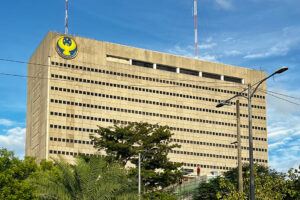THE Development Budget Coordination Committee (DBCC) on Monday trimmed the economic growth target for this year to a range of 6-6.5% but widened the target band to 6-8% for 2025 until 2028, due to “evolving domestic and global uncertainties.”
Budget Secretary Amenah F. Pangandaman, who chairs the DBCC, said Philippine gross domestic product (GDP) is now projected to grow by 6-6.5% this year, narrower than the previous 6-7% goal.
“Despite domestic challenges, we are optimistic that we can still attain our growth target for the year of 6% to 6.5%. In particular, we expect the Philippine economy to bounce back during the last quarter, given the anticipated increase in holiday spending, continued disaster recovery efforts, low inflation, and a robust labor market,” she said at a briefing after a DBCC meeting on Monday afternoon.
The DBCC’s review of the macroeconomic assumptions came after the Philippine economy expanded by a weaker-than-expected 5.2% in the third quarter, which was the slowest since the 4.3% logged in the second quarter of 2023.
In the first nine months, GDP growth averaged 5.8%. To meet the lower end of the government’s revised 6-6.5% target band, the economy would need to grow by 6.5% in the fourth quarter.
Finance Secretary Ralph G. Recto said the Philippine economy can still “realistically” grow by 6% for the full year.
“The growth assumptions for 2025 to 2028 have been given a wider band of 6% to 8%, reflecting the anticipated impact of structural reforms and evolving domestic and global uncertainties,” Ms. Pangandaman said.
To achieve the targets, she said the government is committed to “accelerating infrastructure investments, enhancing the ease of doing business, and boosting national competitiveness.”
The DBCC chair said they expect the recently signed Republic Act No. 12066 or Corporate Recovery and Tax Incentives for Enterprises to Maximize Opportunities for Reinvigorating the Economy (CREATE MORE) Act to spur faster growth and attract more foreign investments.
FISCAL program
“We have maintained our medium-term fiscal targets for 2025 to 2028. This means that we remain determined to reduce the country’s deficit in a more gradual and realistic manner, while also bolstering long-term investments that create more jobs, increase incomes, and decrease poverty incidence,” Ms. Pangandaman said.
The DBCC said it raised the deficit ceiling for 2024 to -5.7% of GDP from -5.6% previously. It kept the deficit ceiling at -5.3% of GDP for 2025, -4.7% for 2026, -4.1% for 2027 and -3.7% for 2028.
For this year, the DBCC raised the revenue outlook to P4.383 trillion in 2024 from P4.27 trillion previously. Revenue targets were kept at P4.644 trillion for 2025, P5.063 trillion for 2026, P5.627 trillion for 2027, and P6.249 trillion for 2028.
“On average, revenue collections are expected to remain at 16.5% of GDP from 2025 to 2028, reaching P6.250 trillion (17% of GDP) by the end of the administration. This means that over the medium term, the government will be collecting a billion more in revenues a day annually,” Ms. Pangandaman said.
She said this will be supported by new measures such as the value-added tax (VAT) on digital services and tax administration reforms centered on digitalization.
At the same time, Ms. Pangandaman said government spending will remain one of the major contributors to growth.
This year’s expenditure program was raised to P5.907 trillion from P5.754 trillion previously.
DBCC expects expenditures to remain at an average of about 21% of the GDP from 2024 until 2028.
The 2025 spending target was maintained to P6.182 trillion; 2026 was set at P6.54 trillion, 2027 to P7.027 trillion, and for 2028 to P7.621 trillion.
“Our fiscal discipline and fluid debt management have recently earned our country a regional on credit rating outlook, found stable to positive from the S&P Global and a series of high rating affirmations from different global credit rating agencies,” Ms. Pangandaman said.
REVISIONS
During its meeting, the DBCC also tweaked the macroeconomic assumptions for inflation, crude oil, foreign exchange rate and exports growth.
Inflation is now projected to average 3.1-3.3% this year, a narrower band from the previous assumption of 3-4%. For 2025 to 2028, inflation assumption is kept at 2-4%.
The assumption for Dubai crude oil prices was trimmed to $78-$81 per barrel this year, from $70-$85 per barrel previously. Crude oil price assumptions were cut to $60-$80 per barrel from $65-$85 per barrel for 2025 to 2028, “with the anticipated improvements in global oil production over the medium term,” the DBCC said.
The DBCC now sees the Philippine peso averaging P57-P57.50 against the US dollar this year, “given sustained remittance growth, recovery in travel services, and growing outsourcing revenues.”
The peso is expected to “broadly stabilize” at P56-P58 per dollar in 2025, and P55-P58 per dollar for 2026 to 2028.
On external trade assumptions, the DBCC lowered the goods export growth to 4% this year from 5% previously, “in line with the observed slowdown in export revenues in recent months as well as the revision in the outlook for the domestic semiconductor industry.”
For 2025 to 2028, exports growth was maintained at 6%.
DBCC kept its assumptions for imports growth at 2% this year, 5% for 2025 and 8% for 2026-2028. — A.R.A.Inosante






